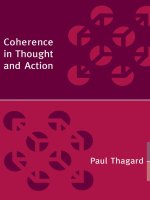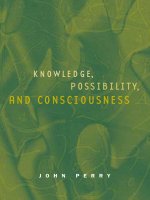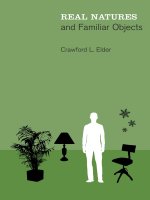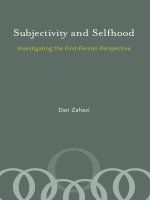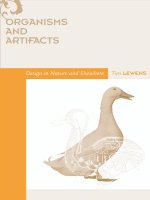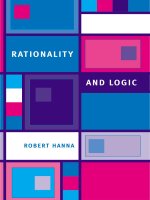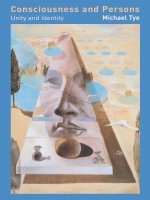the mit press rationality and logic sep 2006
Bạn đang xem bản rút gọn của tài liệu. Xem và tải ngay bản đầy đủ của tài liệu tại đây (1.17 MB, 341 trang )
RATIONALITY
AND LOGIC
ROBERT HANNA
Rationality and Logic
05615_Prelims.qxd 05/03/06 2:24 AM Page i
05615_Prelims.qxd 05/03/06 2:24 AM Page ii
Rationality and Logic
Robert Hanna
A Bradford Book
The MIT Press
Cambridge, Massachusetts
London, England
05615_Prelims.qxd 05/03/06 2:24 AM Page iii
© 2006 Massachusetts Institute of Technology
All rights reserved. No part of this book may be reproduced in any form by any elec-
tronic or mechanical means (including photocopying, recording, or information stor-
age and retrieval) without permission in writing from the publisher.
MIT Press books may be purchased at special quantity discounts for business or sales
promotional use. For information, please email or
write to Special Sales Department, The MIT Press, 55 Hayward Street, Cambridge,
MA 02142.
This book was set in Sabon by SPI Publisher Services and was printed and bound in
the United States of America.
Library of Congress Cataloging-in-Publication Data
Hanna, Robert, 1957–.
Rationality and logic / Robert Hanna.
p. cm.
“A Bradford book.”
Includes bibliographical references and index.
ISBN 0-262-08349-3––ISBN 978-0-262-08349-2 (hc : alk. paper)
1. Logic. 2. Psychologism. 3. Reasoning (Psychology). I. Title.
BC53.H36 2006
128'.33––dc22 2005058402
10987654321
05615_Prelims.qxd 05/03/06 2:24 AM Page iv
To MTH and ETH
Le coeur a ses raisons que la raison ne connâit point
05615_Prelims.qxd 05/03/06 2:24 AM Page v
05615_Prelims.qxd 05/03/06 2:24 AM Page vi
Contents
Preface and Acknowledgments ix
Introduction xi
1 Psychologism Revisited 1
2 E pluribus unum 29
3 The Logocentric Predicament 53
4 Cognition, Language, and Logic 77
5 The Psychology of Reasoning 115
6 Our Knowledge of Logic 155
7 The Ethics of Logic 201
Notes 233
Bibliography 285
Index 309
05615_Prelims.qxd 05/03/06 2:24 AM Page vii
05615_Prelims.qxd 05/03/06 2:24 AM Page viii
Preface and Acknowledgments
This book is about human rationality, logic, and the connection between
them. On my view, this connection is both constitutive and mutual. More
precisely, I defend the broadly Kantian thesis that logic is the result of the
constructive operations of an innate protological cognitive capacity that is
necessarily shared by all rational human animals, and governed by categor-
ically normative principles. Working out and writing up this idea has in-
volved many extended visits to the domains of logical theory and cognitive
psychology. But although I am a philosopher who by virtue of a deep inter-
est in human rationality is also deeply interested in logic and cognition, I am
neither a professional logician nor a professional cognitive psychologist. So
I want to make it very clear in advance that I am drawing and relying even
more heavily than is usual for philosophers on the theoretical expertise of
others. I hope to make my contribution at the synoptic level of the Big
Picture, and then turn this project back over to the specialists as a new and
important joint research program.
I am very grateful to the following people for conversations or correspon-
dence on and around my topic: Sean Anderson, Luc Bovens, Nicholas Denyer,
Christopher Green, Neil Manson, Arlo Murphy, Graham Oddie, Alex Oliver,
Eric Olson, Onora O’Neill, James Russell, Peter Strawson, Evan Thompson,
Dana Vanzanten, John Vejsada, and Jessica Wilson. Shards of the material
were presented to appropriately and helpfully skeptical audiences in talks at
Cambridge University; King’s College London; Trinity College Dublin; and
York University, Canada. Several of the central arguments were first sketched
or talked out during a visiting fellowship at Clare Hall, Cambridge, in
Michaelmas term 1998.
Institutionally speaking, the Social Sciences and Humanities Research
Council of Canada and York University generously gave me research grants
05615_Prelims.qxd 05/03/06 2:24 AM Page ix
for a sabbatical leave from York in 1998–1999; Fitzwilliam College,
Cambridge, generously gave me visiting fellowships for Lent term 2000,
Lent term 2001, and the academic year 2003–2004; and the Faculty of
Philosophy at the University of Cambridge generously gave me the unique
opportunity to lecture on Wittgenstein’s Tractatus and Investigations, back
to back, during Michaelmas term 2003 and Lent term 2004.
Personally speaking, Graham Oddie gave me encouragement at a crucial
moment. Thanks mate.
I also owe special debts of gratitude to Ruth Barcan Marcus and Michael
Potter. Had I not had the good luck to study logic with the former and to be
her logic teaching assistant when I was a graduate student at Yale in the
1980s, this book would never have been started. And had I not had the good
luck in more recent years to be pushed hard by the latter to clarify, refor-
mulate, and rethink my fuzzy thoughts on the logical and the psychological,
this book would never have been finished. Needless to say, neither can be
held in any way responsible for the views I defend here.
One last pair of philosophical acknowledgments—oddly enough, to
Francisco Goya and Blaise Pascal. The caption of the most famous of Goya’s
drawings in the Los caprichos reads: el sueño de la razon produce mon-
struos. The sleep of reason produces monsters. In other words, without
rational guidance we inevitably commit atrocities. Goya’s stark and uncom-
promising pronouncement on human folly and how to prevent it, however,
should always be juxtaposed with the quotation on the dedication page,
which is taken from Pascal’s Pensées (section 4, no. 277). The heart has rea-
sons of its own that reason knows nothing about. In other words, the
rational guidance of human conduct is inevitably embedded in and
inevitably constrained by our equally fundamental pursuits of happiness,
personal integrity, and empathic connectedness with others. These are pur-
suits that may run, most perversely, contrary to our rationality, yet at the
same time they drive rationality itself. Taken separately these two remarks
capture, for me, the moral depth and the moral limits of human rationality.
And taken together they state far better than I ever could my motivations for
writing this book.
x Preface and Acknowledgments
05615_Prelims.qxd 05/03/06 2:24 AM Page x
Introduction
A syllogism is language [logos] in which, certain things being asserted, something else
follows of necessity from their being so.
—Aristotle
1
Logic is a science of reason a science a priori of the necessary laws of thought, not
in regard to particular objects, however, but to all objects in general;—hence a science
of the correct use of the understanding and of reason in general, not subjectively,
however, i.e., not according to empirical (psychological) principles for how the under-
standing does think, but objectively, i.e., according to principles a priori for how it
ought to think.
—Immanuel Kant
2
[T]he word Logic in its primal sense means the Science of the Laws of Thought as
expressed. Considered in this sense, Logic is conversant about all thought which
admits of expression; whether that expression be effected by the signs of common lan-
guage or by the symbolic language of the mathematician.
—George Boole
3
If sheer logic is not conclusive, what is?
—W. V. O. Quine
4
The logical notions are embedded in our deepest nature, in the very form of our lan-
guage and thought, which is presumably why we can understand some kinds of logi-
cal systems quite readily, whereas others are inaccessible to us without considerable
effort . . . if at all.
—Noam Chomsky
5
For all we now know, cognition is saturated with rationality through and through.
—Jerry Fodor
6
This book is a philosophical study of the relation between human rationality
and logic. Its two central claims are (i) that logic is cognitively constructed
by rational animals and (ii) that rational human animals are essentially logical
05615_Prelims.qxd 05/03/06 2:24 AM Page xi
animals. The dual idea expressed by these claims—that logic is intrinsically
psychological, and that human psychology is intrinsically logical—has a long
and troubled history in the philosophical, logical, and psychological tradi-
tions alike. From Pierre Arnauld and Jean Nicole’s Art of Thinking (1662),
through Immanuel Kant’s Jäsche Logic (1800), J. S. Mill’s System of Logic
(1843), and George Boole’s Investigation of the Laws of Thought (1854),
right up to the appearance of Gottlob Frege’s revolutionary Begriffsschrift
(1879), logic and psychology seemed to be, if not precisely the same subject,
then at least theoretically married to one another. But the much-celebrated
attack on “logical psychologism”—the explanatory reduction of logic to
empirical psychology—at the end of the nineteenth century brought about a
nasty divorce. According to the leaders of the attack, Frege and Edmund
Husserl, this parting of the ways was a simple matter of irreconcilable dif-
ferences: the principles or laws of logic are absolutely necessary, whereas the
laws of empirical psychology are only contingent generalizations; logic is
true, whereas empirical psychology deals only with human belief; logic is
a fully formal or “topic-neutral” science, whereas empirical psychology
focuses only on the species-specific or individual contents of mental states;
logical knowledge is a priori or independent of all sense experience, whereas
empirical psychological knowledge is a posteriori or dependent on experi-
ence;
7
and so on. Thereafter “pure logic,” pursued in armchairs by philoso-
phers and philosophically minded mathematicians, went one way, and
“experimental psychology,” pursued in laboratories by men in white coats,
went diametrically another. To make things worse, as Elliott Sober aptly
observes, “while the psychologists were leaving, the philosophers were slam-
ming the door behind them.”
8
Of course philosophy, logic, and psychology have changed a lot since
those days. Most philosophers gave up classical analysis and replaced it with
scientific naturalism: the doctrine that all metaphysical, epistemic, and
methodological questions can ultimately be answered by the natural sciences
alone, without appeal to supernatural facts.
9
Most logicians went from
thinking that all logic is classical or elementary
10
to thinking that logic can
be conservatively “extended”
11
or radically “deviant,”
12
or even mind-blow-
ingly “paraconsistent”
13
or “dialetheic.”
14
And most psychologists dropped
behaviorism and adopted cognitivism: the thesis that the rational human
mind is essentially an active innately specified information-processor.
15
In other words, the philosophers, logicians, and psychologists loosened up
xii Introduction
05615_Prelims.qxd 05/03/06 2:24 AM Page xii
significantly and moved on. But the old myths die hard. Even now, it remains
an almost unchallenged axiom of conventional philosophical wisdom that
the logical and the psychological are intrinsically incompatible.
In my opinion, the view that logic and psychology are fundamentally at
odds with one another could not be more mistaken. On the contrary, if I am
correct there is an essential link between logic and psychology, despite the
fact that logical psychologism is self-refuting and hence false. This brings me
back to the first central claim of this book: logic is cognitively constructed
by rational animals, in the sense that all and only rational animals—includ-
ing, of course, all rational humans—possess a cognitive faculty that is
innately set up for representing logic, because it contains a single universal
“protologic,” distinct in structure from all classical and nonclassical logical
systems, that is used for the construction of all logical systems. I call this
claim the logic faculty thesis. The logic faculty thesis draws explicitly but not
uncritically on some ideas of Kant, Boole, Quine, Chomsky, and Fodor.
But what is logic? This question can mean two very different things. The
first is: what is the science of logic? And the second is: what is the nature of
logic? The first is a question internal to the logical enterprise itself, whereas
the second is a specifically philosophical question.
The internal question can be answered fairly easily, at least in a prelimi-
nary way. Aristotle discovered the science of logic by discovering the science
of syllogisms. A syllogism, in turn, is “language in which, certain things
being asserted, something else follows of necessity from their being so.”
Here, for example, are three syllogisms:
All politicians are crooks.
Dubya is a politician.
Therefore, Dubya is a crook.
All politicians are crooks.
All crooks are liars.
Therefore, all politicians are liars.
If all politicians are crooks and all crooks are liars,
then all politicians are liars.
All politicians are crooks and all crooks are liars.
Therefore, all politicians are liars.
Actually, Aristotle focuses not on concrete or complete syllogisms like these
three, but instead on abstracted or schematic syllogisms; and for special
Introduction xiii
05615_Prelims.qxd 05/03/06 2:24 AM Page xiii
metaphysical and epistemological reasons, he was interested fundamentally
in general propositions and the logical import of general referring terms. But,
for expository convenience, we can also add to the Aristotelian notion of the
syllogism the later Stoic interests in the logical behavior of truth-functional
connectives (such as “not,” “and,” and “if
then”) and the logical import
of names, and derive schematic versions of the three syllogisms listed above:
All As are Bs.
a is an A.
Therefore, a is a B.
All As are Bs.
All Bs are Cs.
Therefore, all As are Cs.
If P, then Q.
P.
Therefore, Q.
Here the schematization of a concrete or complete syllogism is obtained by
uniformly substituting distinct capital letters (say, near the middle of the
alphabet) for distinct sentences;
16
distinct capital letters (say, near the begin-
ning of the alphabet) for distinct predicates; and distinct lowercase letters
(ditto) for distinct individual names. The alphabetic letters are nonlogical
constants. The words left over after the uniform substitution of nonlogical
constants for predicates, sentences, or individual names are logical con-
stants. Within the domain of logical constants we could further distinguish
between “object language” logical constants like “all” (the universal quanti-
fier) and “if . . . then” (the conditional) on the one hand, and “metalinguis-
tic” logical constants like “therefore” (provability or consequence) on the
other; but this subtlety can be left dormant for the time being.
What is of leading importance, in any case, is that each and every con-
crete or complete syllogism fitting into one of these schemata is such that
some sentence follows with necessity from the assertion of some other sen-
tences, together with the assumption of their being so or (what is the same)
their being true. To say that a sentence follows with necessity from the
assertion of some other sentences, together with the assumption of their
being true, is to say that it is impossible that the sentences assumed to be
true will carry over to a false sentence. In other words, truth is necessarily
preserved.
xiv Introduction
05615_Prelims.qxd 05/03/06 2:24 AM Page xiv
If we abstract away altogether now from the special syllogistic framework
of Aristotle’s logic, we can say two things. First, the science of logic is about
“schematizable” language, that is, orderly sequences of sentences linked
together by fixed interpretations of the logical and nonlogical constants
occurring in them. Second, and more precisely, the science of logic is about
schematizable language in which some sentences are asserted and another
sentence is asserted that in fact follows with necessity from the assumed
truth of the asserted sentences. Schematizable language in which some sen-
tences are asserted and another sentence is asserted that is held to follow
from the others is an argument. The asserted sentences are the premises of
the argument. The asserted sentence that is held to follow from the others is
the conclusion of the argument. The fact (whenever it is a fact) that truth is
necessarily preserved from the premises to the conclusion is the validity of
the argument. And the necessary connection between the premises and con-
clusion of a valid argument is the relation of consequence.
17
Thus logic is the
science of the necessary relation of consequence.
So much for a preliminary internal characterization of the science of logic.
But what about the specifically philosophical question about the nature of
logic? My answer is that the nature of logic is explained by the logic faculty
thesis: logic is cognitively constructed by rational animals.
Obviously the fundamental notion lying behind this thesis is that of a
rational animal. For my purposes animals are sentient living organisms and for
simplicity’s sake I shall assume unless otherwise specified that all animals are
sound, that is, intact and mature. Even so, only some animals in this sense are
rational. On my view, rational animals are conscious, rule-following,
18
inten-
tional (that is, possessing capacities for object-directed cognition and purposive
action), volitional (possessing a capacity for willing),
19
self-evaluating, self-
justifying, self-legislating, reasons-giving, reasons-sensitive, and reflectively self-
conscious—or, for short, “normative-reflective”
20
—animals, whose inner and
outer lives alike are sharply constrained by their possession of concepts express-
ing strict modality. Modality in the philosophical sense comprises the concepts
of necessity, possibility, and contingency. Strict modality, in turn, includes the
concepts of logical necessity (truth in all logically possible worlds),
21
epistemic
necessity (certainty or indubitability), and deontic necessity (unconditional
obligation or “the ought”). So, to put my first central claim yet another way,
logic is cognitively constructed by all and only those normative-reflective
animals who are also in possession of concepts expressing strict modality.
Introduction xv
05615_Prelims.qxd 05/03/06 2:24 AM Page xv
This approach to rational animals substantively invokes the concept of
rationality. An unfortunate but pervasive feature of the philosophy of ration-
ality, however, is that it does not operate with either a univocal or generally
accepted sense of the term ‘rationality’.
22
Reasonable people, including spe-
cialists on rationality, are both muddled and also in sharp disagreement
about the very concept of rationality. So in order to avoid troublesome ambi-
guity and state my commitments explicitly I need to make some basic dis-
tinctions, and orient my view in relation to them.
The first basic distinction is between (a) the mentalistic sense of rational-
ity and (b) the procedural sense of rationality. In the mentalistic sense,
rationality is a complex psychological capacity for logical inference and
insight, and also for practical deliberation and decision making. By contrast,
in the procedural sense, rationality is a complex formal property of a certain
class of mechanical, mathematical, computational, or logical processes,
namely the property of being (i) well formed and (ii) either provable and
recursive (Turing-computable), valid (truth-preserving), or sound (valid with
true premises).
23
The crucial difference here is that rationality in the mental-
istic sense is such that all of its manifestations are conscious, whereas some
process can quite easily be rational in the procedural sense without being in
any way conscious.
(For later purposes, it is also quite useful to distinguish, within the men-
talistic sense of rationality, between (a
1
) the rationality of animals, (a
2
), the
rationality of mental episodes or acts, and (a
3
) the rationality of mental
states. The important contrast here is that it is possible for something to be
a rational animal by having an overall mental capacity for rationality, yet fail
to be occurrently rational with respect to some of its mental episodes or men-
tal states, as in the case of someone who completely loses his temper tem-
porarily. Conversely, it is possible for an animal to be occurrently rational
with respect to some of its mental episodes or states, but lack an overall men-
tal capacity for rationality, as in the case of certain sorts of mental illness.
This point in turn implies another useful distinction, again within the men-
talistic sense of rationality, between (a
5
) an animal’s mental capacity for
rationality, and (a
6
) occurrent rationality with respect to the mental episodes
or mental states of an animal. And finally, for completeness, we can also dis-
tinguish, within occurrent mentalistic rationality, between (a
7
) the occurrent
rationality of mental episode or state types, and (a
8
) the occurrent rational-
ity of mental episode or state tokens. Here the contrast is that it is possible
xvi Introduction
05615_Prelims.qxd 05/03/06 2:24 AM Page xvi
for a certain mental episode or state type—say, righteous anger—to be
rational when tokened in some contexts, but fail to be rational when tokened
in others.)
The second basic distinction is beween (c) the meeting-the-minimal-
standards sense of rationality, and (d) the meeting-the-maximal-or-ideal-
standards sense of rationality. In the meeting-the-minimal-standards sense,
rationality means either possessing a psychological capacity for rationality
or meeting the well-formedness conditions for being a rational procedure of
the relevant sort. By contrast, in the meeting-the-maximal-or-ideal-standards
sense, rationality means either perfectly using a psychological capacity or
else perfectly satisfying the provability/computability conditions, validity
conditions, or soundness conditions of the relevant sort of rational proce-
dure. The crucial difference here is that in the meeting-the-minimal-
standards sense, irrationality means lacking the basic conditions necessary
for rationality, and hence means nonrationality; whereas in the meeting-the-
maximal-or-ideal-standards sense, irrationality merely means falling short of
perfect rationality.
The third and last basic distinction is between (e) the principled sense of
rationality, (f) the holistic sense of rationality, and (g) the instrumental sense
of rationality. In the principled sense, rationality means the possession of a
capacity for generating or recognizing necessary truths, a priori beliefs,
strictly universal normative rules, nonconsequentialist moral obligations, and
categorical “ought”-claims.
24
Put in historical terms, this is the Kantian con-
ception of rationality, acccording to which “reason is the faculty of a priori
principles.” By contrast, in the holistic sense, rationality means the possession
of a capacity for systematically seeking coherence (or, to use a contemporary
term of art, “reflective equilibrium”) across a network or web of beliefs,
desires, emotions, intentions, and volitions.
25
In historical terms, this is the
Hegelian conception of rationality, according to which “the truth is the
whole.” And finally, in the instrumental sense, rationality means the posses-
sion of a capacity for generating or recognizing contingent truths, a posteri-
ori beliefs, contextually normative rules, consequentialist obligations, and
hypothetical “ought”-claims.
26
Put historically, this is the Humean concep-
tion of rationality, according to which “reason is the slave of the passions.”
The crucial three-way difference here is that whereas in the principled
sense, rationality means generating or recognizing rules that are absolute or
unconditional, in the holistic sense, by contrast, rationality means generating
Introduction xvii
05615_Prelims.qxd 05/03/06 2:24 AM Page xvii
or recognizing rules or laws that are merely thoroughly interdependent or
mutually conditioned (hence none of those rules or laws can have a greater
degree of necessity or certainty, or be more binding, than the modally or
epistemically weakest proposition in the total holistic network of rules or
laws), and, by another contrast, rationality in the instrumental sense means
generating or recognizing rules that are merely empirically regular or condi-
tional (hence none of those rules or laws can be fully necessary or certain or
binding).
Unless otherwise noted, in what follows I will focus primarily on the men-
talistic, meeting-the-minimal-standards, and principled senses of rationality.
This is not to say that I reject or wish to depreciate in any way the proce-
dural, meeting-the-maximal-or-ideal-standards, holistic, or instrumental
senses of rationality. On the contrary, I am saying only that rationality in the
senses I am primarily interested in should not be confused with other funda-
mentally different senses of rationality.
The class of normative-reflective animals in possession of concepts express-
ing strict modality would appear to be at least extensionally equivalent with
the class of rational humans; and even if (as seems very likely) it is not inten-
sionally equivalent for the simple reason that the cognitive capacities required
for the possession of concepts expressing strict modality are multiply embodi-
able,
27
nevertheless those humans who are rational constitute a central case
or paradigm. I am assuming that it is a primitive fact, yielded directly by the
reader’s capacity for introspection, that there are some rational humans. So I
am proposing to explain the nature of logic by taking human rationality seri-
ously. More precisely, I am proposing to explain the nature of logic by taking
rationality seriously, and to take rationality seriously by taking human ration-
ality seriously. And what we reach at the end of this explanation is the thesis
that something protological is built innately into human rationality itself.
This leads me back to my second central claim: rational human animals are
essentially logical animals, in the sense that a rational human animal is
defined by its being an animal with an innate constructive modular capacity
for cognizing logic, a competent cognizer of natural language, a real-world
logical reasoner, a competent follower of logical rules, a knower of necessary
logical truths by means of logical intuition, and a logical moralist. This is
what I call the logic-oriented conception of human rationality.
Is it possible to be a skeptic or an eliminativist about human rationality?
Yes. But there is clearly something reflexively odd and even cognitively
xviii Introduction
05615_Prelims.qxd 05/03/06 2:24 AM Page xviii
self-stultifying, if not outright self-contradictory, about having reasons for
doubting or getting rid of rationality. I will address that point in chapter 7.
But it must also be frankly admitted that if someone upon serious reflection
simply does not believe that there is any such thing as rationality per se or
human rationality in particular, or that these are pseudo-concepts that ought
to be eliminated, then there is probably little I can do to convince him. I am
assuming that the existence of rationality and human rationality are primi-
tive and irreducible facts, and that as a consequence the prima facie case for
their reality and conceptual integrity is far more compelling than any
attempt to reject or eliminate them. Nevertheless, even allowing that it is
cognitively coherent to try to challenge rationality, a rationality-skeptic or
rationality-eliminativist might still find it interesting to inquire into the
extent that the nature of logic could be explained, if one were to take human
rationality seriously.
Whether or not there are rational animals other than humans, rational
human animals as a matter of fact constitute the basic class of cognizers or
thinkers studied by cognitive psychology. So if I am correct about the con-
nection between rationality and logic, it follows that the nature of logic is
significantly revealed to us by cognitive psychology. Correspondingly, I call
the overall view expressed by the conjunction of my two central claims log-
ical cognitivism.
Logical cognitivism has two important and rather controversial conse-
quences. First, the philosophers must reopen their door and civilly invite
the psychologists back in. As some people have been saying for two or
three decades now, we are all colleagues working in the very same metadis-
cipline: cognitive science. On this picture, analytic philosophy is at bottom
the same as the philosophy of rational human cognition. Second, however,
and perhaps even more controversially, a reconciliation between philoso-
phy and psychology by way of logical cognitivism must also be expected to
change cognitive science itself quite radically. Wittgenstein pregnantly
remarks in the Tractatus that “logic precedes every experience—that some-
thing is so.”
28
My way of glossing this is to say that logic is not strictly
determined by the contingent or natural facts: by which I mean that it is
not the case that logic is nothing over and above all physical facts plus all
sensory experiential facts. In other words, logic is not basically physical and
a posteriori. That, I believe, is the correct way to understand the fundamen-
tal lesson taught us by Frege’s and Husserl’s critique of logical psychologism.
Introduction xix
05615_Prelims.qxd 05/03/06 2:24 AM Page xix
Thirty years later, Wittgenstein equally pregnantly remarks in the Investi-
gations that
[I]f language is to be a means of communication there must be agreement not only in
definitions but also (queer as this may sound) in judgments. This seems to abolish
logic, but does not do so.
29
My way of glossing this is to say that logic is necessarily bound up with the
human activity of linguistic communication and in particular with the
human activities of making theoretical and practical judgments. Or in other
words, logic is intrinsically normative. On this extended picture, analytic
philosophy is at bottom the same as rational anthropology.
30
So it follows
from antipsychologism, together with the necessary connection between
logic and language, together with logical cognitivism, that cognitive science
is not at bottom a natural science. Instead it is both an objective or truth-
oriented science and also what some nineteenth-century philosophers rather
quaintly called a “moral science”—that is, a normative human science or
Geisteswissenschaft—just like logic itself.
This does not mean that the natural sciences are not highly relevant to cog-
nitive science. Of course they are highly relevant! It means simply that the
natural sciences cannot in and of themselves provide the foundations of cog-
nitive science. It is significantly odd that contemporary conventional philo-
sophical wisdom should include, simultaneously, strong commitments to
scientific naturalism and to the assumption that the logical and the psycho-
logical are incompatible.
31
I am interested in trying to formulate and defend
the broadly Kantian theory
32
of human rationality and logic that results if
we firmly reject both of these assumptions.
It may be useful to the reader, before pressing on, to have a sketch of the
overall argument in front of her.
In the first three chapters I explore three different philosophical approaches
to the nature of logic, each in the form of a basic problem. Chapter 1 deals
with the problem of logical psychologism: what is the relation between the
logical and the psychogical? Here I argue that logical psychologism is a
species of scientific naturalism; that scientific naturalism about logic is false;
and that logical cognitivism can effectively avoid both logical scientific natu-
ralism and the equally but oppositely flawed doctrine of logical platonism.
Chapter 2 addresses what I call the e pluribus unum problem: how can we
reconcile the unity of logic with the plurality of logical systems distinct from
classical or elementary logic? I argue that, despite their deep differences, all
xx Introduction
05615_Prelims.qxd 05/03/06 2:24 AM Page xx
logical systems—whether classical, extended, or deviant—must presuppose a
single universal protologic, distinct in structure from all classical or nonclas-
sical systems, that is used to construct those systems. I then propose that this
protologic is contained in the logic faculty. If correct, my proposal implies
that the precise structural description of this protologic can be turned over to
logicians and cognitive psychologists as a new and important joint research
program. Chapter 3 deals with a deep problem called the logocentric predica-
ment, which arises from the very unsettling fact that in order to explain any
logical theory, or justify any deduction, logic is presupposed and used—so
logic appears to be both inexplicable and unjustified. On the assumption that
logic must have a nonlogical and nonpsychological foundation, the logocen-
tric predicament is insoluble and devastating. But on the alternative assump-
tion that logic has a logico-psychological foundation in the fact that a single
universal protologic is innately contained in the logic faculty, the logocentric
predicament loses its sting: it is merely another way of expressing the first half
of logical cognitivism.
In the next three chapters I turn from philosophical logic to human ration-
ality. In chapter 4, I argue that human thinking conforms to what I call the
standard cognitivist model of the mind, a model which has its remote origins
in Kant’s transcendental psychology and its proximal sources in Chomsky’s
psycholinguistics. This model includes representationalism or intentional-
ism, innatism or nativism, constructivism, modularity, and a mental lan-
guage or language of thought. I then critically refine the model, and also
extend it to include the thesis that the language of thought presupposes a
mental logic or logic of thought. This chapter also offers a defense of the
logic-oriented conception of human rationality, and of the thesis that
rational human animals are defined by their possession of logical abilities
and are necessarily also linguistic animals, but that not all linguistic humans
are rational, nor are all linguistic animals rational. In chapter 5 I develop an
empirical argument in favor of logical cognitivism by first critically sifting
through classical and recent work on the psychology of human reasoning,
then second defending a doctrine I call the protological competence theory,
then third and finally applying this doctrine to the heated debate about
human rationality in recent cognitive science and philosophy. In chapter 6
I sketch the outlines of a theory of logical knowledge, based on logical in-
tuition, in response to natural extensions of Wittgenstein’s famous worry
about “following a rule,” and Paul Benacerraf’s almost equally famous
Introduction xxi
05615_Prelims.qxd 05/03/06 2:24 AM Page xxi
worry about reconciling our face-value or standard semantics of mathemat-
ical truth with our best epistemology of intuitive knowledge.
The seventh and last chapter subsumes the themes of the earlier chapters
under a discussion of the normativity of logic. The central claim is that logic
is a moral or “prescriptive” science and not merely a factual or “descriptive”
one, because the principles and concepts of the single universal protologic,
whatever they turn out to be, must be intrinsically categorically normative—
unconditionally obligatory—for human reasoning. The proper construal of
this claim leads to three further claims. First, the obvious fact that humans
persistently make logical gaffes does not count in any way against their being
logical animals but, on the contrary, counts all the more strongly in favor of
it: only a logical animal would ever care about committing fallacies, just as
only a moral animal would ever care about committing sins. Second, the obvi-
ous gap between abstract logical systems and concrete human reasoning does
not entail, as Gilbert Harman has argued, that logic has little or nothing to
do with reasoning. Third and finally, attempts by neo-Nietzscheans (and also
by some contemporary cognitive scientists) to defend the skeptical thesis that
humans are irrational and could at least in principle become logic-liberated
animals, because their logical reasoning abilities are nothing but expressions
of “the will-to-power” (or: “mechanisms of natural selection”), and because
logic itself is nothing but a social construct (or: the result of using “social con-
tract schemas”), while surprisingly resistant to philososophical refutation,
ultimately fail because they are cognitively self-defeating.
xxii Introduction
05615_Prelims.qxd 05/03/06 2:24 AM Page xxii
Rationality and Logic
05615_Prelims.qxd 05/03/06 2:24 AM Page xxiii
05615_Prelims.qxd 05/03/06 2:24 AM Page xxiv
